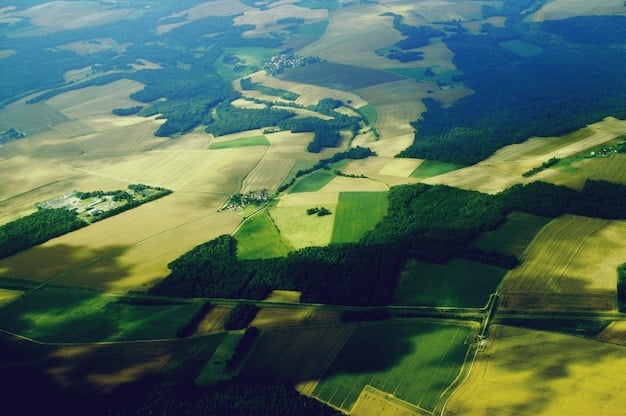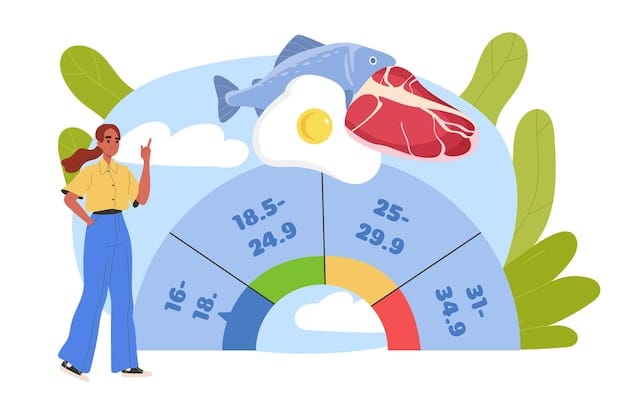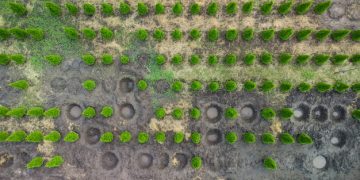The Environmental Impact of Food Choices: A Data-Driven Analysis

The impact of food choices on the environment is significant, with data revealing how dietary habits contribute to greenhouse gas emissions, deforestation, water usage, and pollution, necessitating informed and sustainable food consumption practices.
Our food choices have a profound and far-reaching influence on the environment. Understanding the impact of food choices on the environment: a data-driven analysis is crucial for making informed decisions that promote sustainability and reduce our ecological footprint.
Understanding the Environmental Impact of Food Production
Food production is a complex process involving agriculture, manufacturing, transportation, and consumption. Each stage has environmental consequences, contributing to various forms of pollution and resource depletion.
Greenhouse Gas Emissions
Agriculture is a significant contributor to greenhouse gas emissions. Livestock farming, in particular, releases large quantities of methane and nitrous oxide, potent greenhouse gases. Crop cultivation also contributes through the use of fertilizers and machinery.
Deforestation and Habitat Loss
The expansion of agricultural land often leads to deforestation, especially in regions like the Amazon rainforest. This not only reduces biodiversity but also diminishes the planet’s capacity to absorb carbon dioxide.

- Livestock farming requires vast areas for grazing and feed production.
- Monoculture farming practices can deplete soil nutrients and reduce biodiversity.
- Deforestation releases stored carbon into the atmosphere, exacerbating climate change.
Sustainable farming practices, such as agroforestry and crop rotation, can help mitigate these negative impacts. By integrating trees into agricultural landscapes and diversifying crop types, we can enhance soil health and promote biodiversity.
The Carbon Footprint of Different Diets
Different diets have varying carbon footprints. A diet rich in animal products, especially beef and dairy, generally has a higher environmental impact compared to a plant-based diet.
Meat Consumption
Meat production requires more resources than plant-based alternatives. The production of beef, in particular, is associated with high greenhouse gas emissions, land use, and water consumption.
Plant-Based Diets
Plant-based diets, which emphasize vegetables, fruits, grains, and legumes, have a significantly lower environmental impact. These diets require fewer resources and produce fewer emissions.
Eating locally sourced and seasonal produce can further reduce the carbon footprint of a plant-based diet. This minimizes transportation emissions and supports local farmers who often employ sustainable practices.
Water Usage in Food Production
Water is a critical resource in food production. Agriculture accounts for a significant portion of global water usage, with varying levels of efficiency depending on the crop and farming practices.
Irrigation Practices
Inefficient irrigation practices can lead to water wastage and depletion of aquifers. Over-extraction of groundwater can also cause land subsidence and saltwater intrusion in coastal areas.
Water-Intensive Crops
Some crops, such as almonds and rice, require large amounts of water to grow. Shifting towards less water-intensive crops and implementing efficient irrigation techniques can help conserve water resources.

- Drip irrigation delivers water directly to plant roots, reducing water loss through evaporation.
- Rainwater harvesting can supplement irrigation needs and reduce reliance on groundwater.
- Selecting drought-resistant crops can minimize water requirements in arid regions.
By adopting water-efficient farming practices and being mindful of water-intensive foods, we can reduce our water footprint and promote sustainable water management.
The Role of Food Waste in Environmental Degradation
Food waste is a significant environmental problem. When food is wasted, all the resources used in its production, transportation, and storage are also wasted, contributing to greenhouse gas emissions and resource depletion.
Household Food Waste
A significant portion of food waste occurs at the household level. Planning meals, storing food properly, and using leftovers creatively can help reduce household food waste.
Supply Chain Waste
Food waste also occurs throughout the supply chain, from farms to retailers. Improving storage and transportation infrastructure, as well as adopting better inventory management practices, can help minimize waste.
Composting is an effective way to divert food waste from landfills and create nutrient-rich soil amendments. Composting can be done at home or on a larger scale by municipalities.
Sustainable Food Choices for a Healthier Planet
Making informed and sustainable food choices is essential for protecting the environment. By shifting towards more sustainable diets and adopting eco-friendly practices, we can reduce our environmental impact.
Reducing Meat Consumption
Reducing meat consumption, especially beef, is one of the most impactful actions individuals can take. Opting for plant-based alternatives or choosing sustainably raised meat can significantly lower your carbon footprint.
Supporting Local and Sustainable Agriculture
Supporting local and sustainable agriculture helps reduce transportation emissions and promotes eco-friendly farming practices. Buying from farmers’ markets and choosing organic produce can support these efforts.
- Participate in community-supported agriculture (CSA) programs to support local farmers.
- Choose organic produce to reduce exposure to synthetic pesticides and fertilizers.
- Support regenerative agriculture practices that enhance soil health and biodiversity.
By making conscious food choices, we can contribute to a more sustainable and resilient food system that benefits both our health and the environment.
Policy and Technological Innovations for Sustainable Food Systems
Addressing the environmental impact of food choices requires a multi-faceted approach involving policy interventions, technological innovations, and individual actions.
Government Policies
Government policies can play a crucial role in promoting sustainable food systems. Subsidies for sustainable agriculture, taxes on environmentally harmful practices, and regulations on food waste can incentivize more eco-friendly behavior.
Technological Innovations
Technological innovations, such as precision agriculture, vertical farming, and alternative protein sources, offer promising solutions for reducing the environmental impact of food production.
- Precision agriculture uses data and technology to optimize resource use and reduce waste.
- Vertical farming allows for year-round crop production in urban areas, reducing transportation emissions.
- Alternative protein sources, such as plant-based meats and cultivated meat, offer more sustainable alternatives to traditional livestock farming.
By fostering innovation and implementing supportive policies, we can create a food system that is both environmentally sustainable and economically viable.
| Key Point | Brief Description |
|---|---|
| 🌱 Plant-Based Diets | Lower carbon footprint compared to meat-heavy diets. |
| 💧 Water Conservation | Efficient irrigation and less water-intensive crops. |
| 🗑️ Reducing Food Waste | Meal planning and proper storage to minimize waste. |
| 🚜 Sustainable Farming | Supporting local and organic agriculture. |
Frequently Asked Questions
▼
Food production significantly impacts the environment through greenhouse gas emissions, deforestation, water usage, and pollution. These factors contribute to climate change and ecosystem degradation.
▼
Meat consumption, particularly beef, has a high environmental footprint due to methane emissions from livestock, extensive land use for grazing, and water consumption for feed production.
▼
Plant-based diets have a lower environmental impact as they require fewer resources, produce fewer emissions, and reduce the demand for deforestation and water-intensive agriculture.
▼
Reducing food waste conserves resources used in production, transportation, and storage, which reduces greenhouse gas emissions and minimizes the strain on landfills and ecosystems.
▼
Sustainable agriculture focuses on eco-friendly practices that enhance soil health, reduce pollution, and promote biodiversity. It ensures long-term food production without harming the environment.
Conclusion
Understanding the intricate relationship between our food choices and the environment is crucial for fostering a sustainable future. By adopting informed dietary habits and supporting eco-friendly agricultural practices, we can collectively mitigate the adverse impacts of food production and consumption on our planet.





